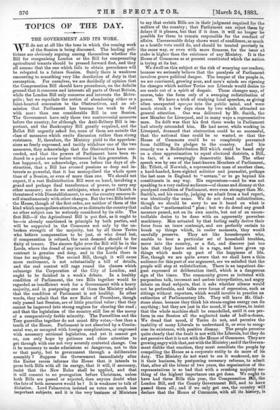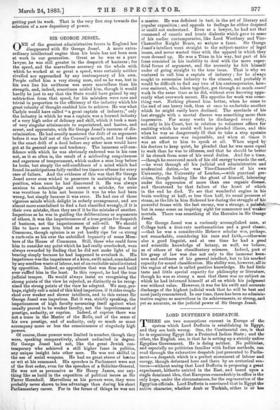TOPICS OF THE DAY.
THE GOVERNMENT AND ITS WORK.
Wh do not at all like the tone in which the coming work of the Session is being discussed. The leading poli- ticians are obviously arguing among themselves whether the Bill for reorganising London or the Bill for compensating agricultural tenants should be pressed forward first, and they all assume that the one which fails to obtain precedence will be relegated to a future Session. Surely there is weakness amounting to something very like dereliction of duty in that assumption. For ourselves, we are decidedly of opinion that the Compensation Bill should have precedence, on the definite ground that it concerns and interests all parts of Great Britain, while the London Bill only concerns and interests the Metro- polis ; but we repudiate the notion of abandoning either as a faint-hearted concession to the Obstructives, and an ad- mission that Parliament has become too weak to deal with mon than one considerable Bill in one Session. The Government have only these two controversial measures before the country, for although the Anti-Bribery Bill is im- portant, and the Bankruptcy Bill greatly required, and the Ballot Bill urgently asked for, none of them are outside the class of measures which excite discussion rather than strong resistance. If, therefore, the Ministry yield to the apprehen- sions so freely expressed, and tacitly withdraw one of the two measures, they acknowledge that the Obstructives have suc- ceeded, and that the powers of Parliament have been re- duced to a point never before witnessed in this generation. It has happened, we acknowledge, even before the days of ob- struction, that a Bill has aroused passions so deep and in- terests so powerful, that it has monopolised the whole spare time of a Session, or even of more than one. We should not expect, if a vast Redistribution Bill were on hand, involving a grand and perhaps final transference of power, to carry any other measure ; nor do we anticipate, when a great Church is threatened with Disestablishment, to see the country concern it- self simultaneously with other changes. But the two Bills before the House, though of the first order, are neither of them of the kind which monopolises attention, or so distracts the country that no other subject can be seriously considered by its side. The first Bill—if the Agricultural Bill is put first, as it ought to be—is already sanctioned in principle by both parties, and will be supported in the Commons not only by the un- broken strength of the majority, but by all those Tories who believe compensation to be just, or who dread lest, if compensation is refused, the next demand should be for fixity of tenure. The sincere fight over the Bill will be in the Lords, where the dread of any invasion of the principle of free contract is genuine and deep, and in the Lords there is time for anything. The second Bill, though it will cause more excitement, is not substantially a bill of details, and the real contest will rage round the clauses which submerge the Corporation of the City of London, and ought to be finished in a week's debate. In a healthy condition of Parliament, the two Bills together would be regarded as insufficient work for a Government with a heavy majority, and in postponing one of them the Ministry admit that the condition of Parliament is not healthy. In other words, they admit that the new Rules of Procedure, though only passed last Session, are of little practical value ; that they cannot be improved into strong engines for clearing the road ; and that the legislation of the country still lies at the mercy of a comparatively feeble minority. The Parnellites and the Tory guerrillas together do not count fifty votes,—less than a tenth of the House. Parliament is not absorbed by a Contin- ental war, or occupied with foreign complications, or engrossed with necessary sectional legislation, and yet it cannot get on, can only hope by patience and close attention to get through with one not very severely contested change. Can it be necessary to make admissions so dangerous, not to this or that party, but to government through a deliberative
assembly Suppose the Government immediately after the Easter recess informs the House that it intends to press both Bills with all its energy, that it will, if necessary, insist that the New Rules shall be applied, and that it will consent to no prorogation before Christmas, unless both Bills are passed or rejected, does anyone doubt what the fate of both measures would be ? It is weakness to talk of dictation. Lord Palmerston insisted on votes on much less important subjects, and it is the very business of Ministers to say that certain Bills are in their judgment required for the welfare of the country ; that Parliament can reject them by delays if it pleases, but that if it does, it will no longer be possible for them to remain responsible for the conduct of affairs. Unreasonable delay shows want of confidence, as much as a hostile vote could do, and should be treated precisely in the same way, or even with more firmness, for the issue at stake is higher than the existence of any Ministry. It is the House of Commons as at present constituted which the nation. is trying at its bar.
We dwell on this subject at the risk of wearying our readersi, because we seriously believe that the paralysis of Parliament involves grave political danger. The temper of the people is, we are convinced, growing sour, and men's minds are ripening for changes which neither Tories nor Liberals would desire to• see made out of a spirit of despair. Those changes may, of course, take the form only of a sweeping redistribution of power. We have a trick of studying local speeches, as giving often unexpected aftercus into the public mind, and were much struck a few days since by two which attracted no general attention. One was delivered by Mr. Smith, the new Member for Liverpool, and in many ways a representative man. Its drift was that his first three weeks in Parliament had utterly astounded him. He had never, while working irt Liverpool, dreamed that obstruction could be so successful,. that the national time could be so wasted, or that the• House of Commons could be so completely prevented from fulfilling its pledges to the country. And his remedy was a Redistribution Bill which could be based only- on a close approximation to equal electoral districts, a
in fact, of a sweepingly democratic kind. The other speech was by one of the least-known Members of Parliament,. Mr. Tillett, of Norwich, a representative man of another class, a hard-headed, keen-sighted solicitor and journalist, perhaps the last man in England to " scream," or to go beyond his. constituents in any way. His expressions—and he was not speaking to a very radical audience—of shame and dismay at the paralysed condition of Parliament, were even stronger than Mr.. Smith's, and his remedy, judging we admit from a bad report, was identically the same. We do not dread redistribution,. though we should be sorry to see it based on what is called the " mathematical " plan ; but we do dread any grand measure passed, not on its own merits, but out of an uncon- trollable desire to be done with an apparently powerless machinery. Men actuated by that feeling really derive their force from an inner contempt, and are perfectly certain to. break up things which, in cooler moments, they would.
carefully . preserve. They act like housekeepers who, unable to bear a particular set of household troubles, move into the country, or a flat, and discover just too- late that they have acted in a rage, and have given up things which made up part of the happiness of life. Nor, though we are quite aware that we shall have a thin audience for this part of our argument, are we satisfied that the people will stop at redistribution. There is an impatient dis- gust expressed at deliberation itself, which is a dangerous. sign of the times. The community grows so irritated with purposeless talk, incessant and useless interpellation, and angry debate on dead subjects, that it asks whether silence would not be preferable, and talks over forms of repression, such as sittings without reporters, which would involve in practice an extinction of Parliamentary life. They will leave Mr. Glad- stone alone, because they think his steam-engine energy can do. anything ; but they are just in the mood, if he retires, to insist that the whole machine shall be remodelled, until it can per- form in one Session all the neglected tasks of half-a-dozen. We dread that mood, if Tories do not, and perceive the inability of many Liberals to understand it, or even to recog- nise its existence, with positive dismay. The people perceive quite clearly that the fault is not with the Liberals, but they do• not perceive that it is not with the House of Commons. They are growing angry with that, not with the Ministry; and if the Govern- ment dislike that emotion, they must conciliate the people by compelling the House as a corporate entity to do more of its duty. The Ministry do not want to see it weakened, nor is it their business, by postponing necessary reforms, to admit that, after all the labour of two years, the organisation of the representatives is so bad that with a crushing majority no- thing of the highest importance can get done. We ought to have had three Bills this year, the Compensation Bill, the London Bill, and the County Government Bill, and to have passed them all ; and if we only get one, the country will declare that the House of Commons, with all its history, is
getting past its work. That is the very first step towards the selection of a new depository of power.



































 Previous page
Previous page